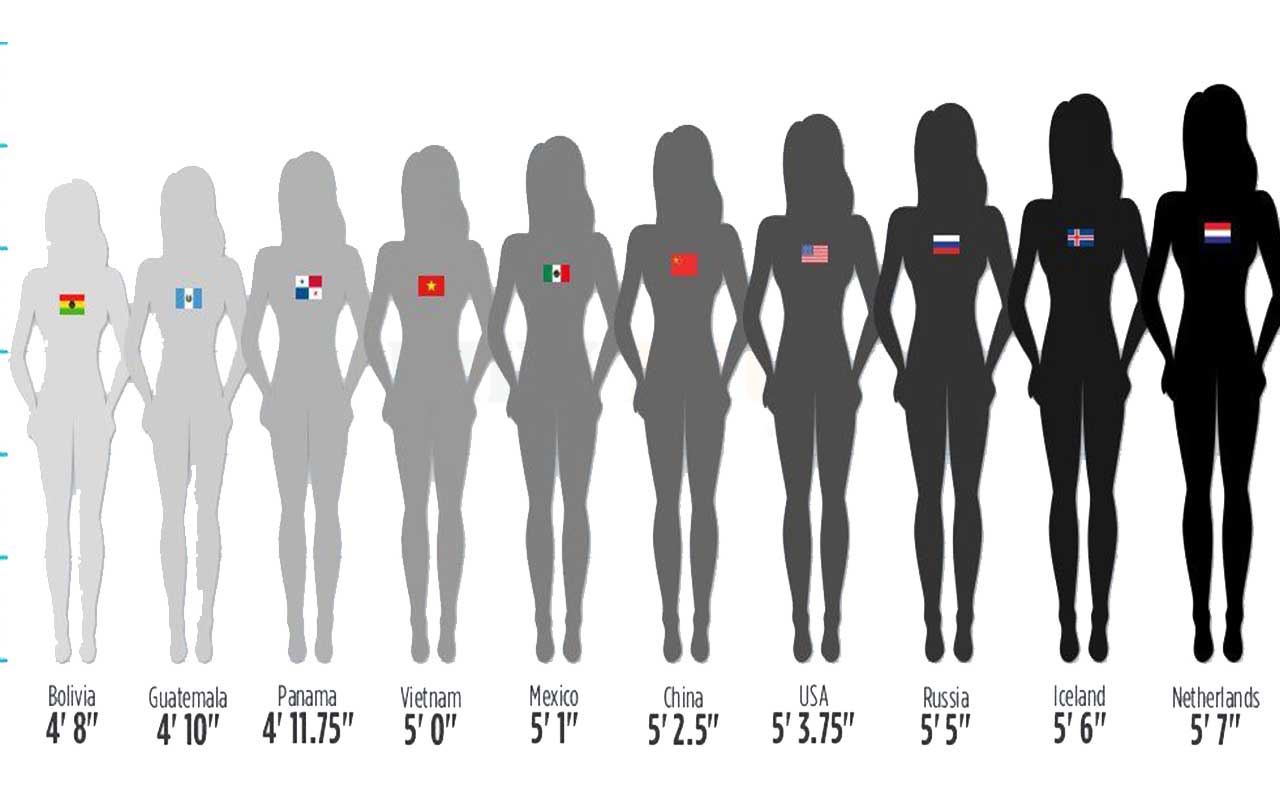The average height of women varies depending on the country. In the United States, the average height of a woman is 5’4″. In the world, the average height of a woman is 5’3″.
There are a number of factors that can affect height, including genetics, nutrition, and exercise. Genetics is the most important factor, accounting for about 80% of a person’s height. Nutrition and exercise can also play a role, but they are less important than genetics. This article will discuss the average height of women in the United States and around the world. It will also discuss the factors that can affect height and how to increase height.

The Average Height of Women in the US
The average height of women in the United States is 5 feet 4 inches. This is based on data from the Centers for Disease Control and Prevention (CDC). The average height of women has been increasing over time and is expected to continue to increase in the future. In 1960, the average height of women was 5 feet 3 inches (160 centimeters). By 2018, the average height of women had increased to 5 feet 4 inches (162.56 centimeters). There are a number of factors that can affect height, including genetics, nutrition, and exercise. Genetics is the most important factor, accounting for about 80% of a person’s height. Nutrition and exercise can also play a role, but they are less important than genetics.
| Women’s Height by Ethnicity in the U.S. | ||
|---|---|---|
| Ethnicity | US Women’s height in Inches | US Women’s height in Centimeters |
| Non-Hispanic White | 63.9 in (5 ft 3.9 in) | 162.4 cm |
| Non-Hispanic Black | 64 in (5 ft 4 in) | 162.5 cm |
| Non-Hispanic Asian | 61.5 in (5 ft 1.5 in) | 156.3 cm |
| Hispanic | 62 in (5 ft 2 in) | 157.5 cm |
| Mexican American | 61.7 in (5 ft 1.7 in) | 156.8 cm |
The Average Height of Women in the World

The average height of women in the world is 5 feet 3 inches (166 cm) (Source: World In Data). This number varies depending on the country, with women in some countries being taller than others. For example, women in the Netherlands are the tallest in the world, with an average height of 5 feet 7 inches (170 cm). Women in Guatemala are the shortest in the world, with an average height of 5 feet 1 inch (155 cm).
Here’s a concise overview of how women’s height has changed over time:
- Early 20th Century: Average height for women was around 150-155 cm (4 feet 11 inches to 5 feet 1 inch).
- Mid-20th Century (1950s): Average height increased to about 157-160 cm (5 feet 2 inches to 5 feet 3 inches).
- Late 20th Century (1980s): Continued growth led to averages of 160-162 cm (5 feet 3 inches to 5 feet 4 inches).
- Early 21st Century (2000s): Average height reached approximately 162-164 cm (5 feet 4 inches to 5 feet 5 inches).
- Recent Data (2020s): Average height for women in many developed countries is around 164-167 cm (5 feet 5 inches to 5 feet 6 inches).
Height increases are attributed to better nutrition, healthcare, and overall living conditions.
There are a number of factors that can affect a person’s height, including genetics, nutrition, and access to healthcare. Genetics is the most important factor, accounting for about 80% of a person’s height. Nutrition and access to healthcare can also play a role, especially during childhood and adolescence.
| Mean Female Height by Country | ||
|---|---|---|
| Country | Mean Height in Inches | Mean Height in Centimeters |
| Argentina | 62.7 in (5 ft 2.7 in) | 159.2 cm |
| Australia | 65.3 in (5 ft 5.3 in) | 165.9 cm |
| Bermuda | 63.3 in (5 ft 3.3 in) | 160.7 cm |
| China | 62.9 in (5 ft 2.9 in) | 159.7 cm |
| Ethiopia | 61.3 in (5 ft 1.3 in) | 155.7 cm |
| India | 60.1 in (5 ft 0.1 in) | 152.6 cm |
| Mexico | 61.8 in (5 ft 1.8 in) | 156.9 cm |
| Nigeria | 61.5 in (5 ft 1.5 in) | 156.3 cm |
| North Korea | 62.6 in (5 ft 2.6 in) | 159.0 cm |
| Russia | 65.1 in (5 ft 5.1 in) | 165.3 cm |
| South Asia | 60.4 in (5 ft 0.4 in) | 153.3 cm |
| United Kingdom | 64.7 in (5 ft 4.7 in) | 164.4 cm |
While height is a physical trait that cannot be changed, it is important to remember that it is not a measure of a person’s worth. People of all heights can be successful and happy.
Factors That Affect Height

Height is a complex trait that is influenced by a variety of factors, including genetics, nutrition, exercise, sleep, and medical conditions. While genetics is the most important factor, environmental factors can also play a role. For example, children who are malnourished or who have chronic diseases are more likely to be shorter than children who are healthy and well-nourished.
Here are 5 most important factors that determine how tall you can grow:
- Genetics: Genetics is the most important factor affecting height. Studies have shown that DNA is responsible for about 80% of a person’s height.
- Nutrition: A healthy diet that is rich in protein, calcium, and other essential nutrients is essential for optimal growth and development.
- Exercise: Exercise helps to stimulate the growth of bones and muscles, which can lead to increased height.
- Sleep: Sleep is essential for the production of growth hormones, which are responsible for promoting growth.
- Medical conditions: Some medical conditions, such as growth hormone deficiency and Prader-Willi syndrome, can affect a person’s height.
There is no one-size-fits-all answer to the question of how to increase height. However, there are a number of things that people can do to promote healthy growth and development. These include:
- Eating a healthy diet that is rich in protein, calcium, and other essential nutrients.
- Getting regular exercise.
- Getting enough sleep.
- Avoiding smoking and alcohol.
- Managing stress.
If you are concerned about your height, it is important to talk to your doctor. They can assess your individual situation and recommend a course of action that is right for you.
How to Increase Height

If you want to know how to increase your height, you are not alone. Many people wish they could grow taller, especially during their teenage years. However, your height is largely determined by your genetics and environmental factors. There are some things you can do to optimize your growth potential, but there is no guarantee that you will grow taller than your genes allow.
To increase your height naturally, we can suggest some of the following tips:
Eat a balanced diet: During your growing years, it’s crucial that you get all of the nutrients your body needs. Your diet should include fresh fruits, fresh vegetables, whole grains, proteins, and dairy. You should limit or avoid foods containing high amounts of sugar, trans fats, and saturated fats.
Use supplements with caution: There are only a few cases where supplements may be appropriate to increase height in children and combat shrinking in older adults. For example, if you have a condition that affects your human growth hormone (HGH) production, a doctor may recommend a supplement containing synthetic HGH. Additionally, older adults may be advised to take vitamin D or calcium supplements to reduce their risk of osteoporosis.
Get the right amount of sleep: Occasionally skimping on sleep won’t affect your height in the long term. However, chronic sleep deprivation can interfere with your growth hormone production and affect your overall health. Aim for 8 to 10 hours of sleep per night if you’re a teenager or younger adult.
Stay active: Physical activity can improve your blood circulation and muscle strength, which can help you grow taller. Some exercises that can stretch and lengthen your spine include swimming, cycling, yoga, pilates, and hanging from a bar. However, avoid overdoing it or injuring yourself as this can hamper your growth.
Maintain good posture: Good posture doesn’t actually make you grow taller, but it can help you look taller and prevent spinal compression. To improve your posture, keep your back straight and shoulders back when sitting or standing. Avoid slouching or hunching over your phone or computer. You can also do some exercises to strengthen your core muscles and spine.
While these tips may help you reach your full height potential during your growing years, they may not have much effect once you stop growing. Most people stop growing taller after they go through puberty. This means that as an adult, you are unlikely to increase your height.
However, there are some ways to appear taller as an adult without actually increasing your height. For example:
- Wear clothes that fit well and flatter your body type. Avoid baggy or oversized clothes that can make you look shorter or bulkier.
- Choose shoes that have heels or platforms. You can also wear shoe inserts or lifts to add some extra inches to your height discreetly.
- Style your hair in a way that adds volume or length to your face. Avoid hairstyles that cover your forehead or make your head look smaller.
- Accessorize with vertical lines or patterns that draw attention to your upper body. Avoid horizontal lines or patterns that can make you look wider or shorter.
How to Increase Height After 18
Many people wonder how to increase their height after 18, especially if they are unhappy with their current stature. However, the truth is that your height is mostly determined by your genetics and environmental factors during your childhood and adolescence. Once you reach adulthood, your height is unlikely to change significantly.
Most people stop growing taller after they go through puberty, which usually happens between ages 14 and 20. This is because the growth plates at the ends of your long bones become fused together, preventing further elongation. Therefore, there is no scientific evidence that you can increase your height after 18 by taking supplements, hormones, or medications.
However, this does not mean that you cannot improve your appearance and health by following some natural tips. In fact, it is possible to increase your height after 18, but it is more difficult. Some of the ways you can optimize your height potential and look taller are:
- Continue to eat a healthy diet and exercise regularly.
- Consider taking growth hormone supplements.
- Talk to your doctor about other options that may be available to you.
While these strategies may not guarantee a significant height increase after the age of 18, they can help you optimize your posture, overall health, and well-being. It’s important to have realistic expectations and embrace yourself as you are, focusing on personal growth and embracing the qualities that make you exceptional.
How to Increase Height for Teens
If you are a teenager who wants to increase your height, you may have some questions about how to do it. The good news is that you are still in your growing years, which means that you have some potential to grow taller. However, the bad news is that your height is mostly determined by your genetics and environmental factors that you cannot control.
During puberty, teens go through a growth spurt. This is the time when they are most likely to reach their full height potential. There are a number of things teens can do to maximize their height during this time, including:
- Eating a healthy diet that is rich in calcium, protein, and vitamin D.
- Getting enough sleep.
- Exercising regularly.
- Avoiding smoking and excessive alcohol consumption.
How to Increase Height for Kids
Kids are still growing and developing, so there are a number of things parents can do to help them reach their full height potential. While genetics primarily determines one’s height, there are a few lifestyle factors that can support healthy growth and maximize height potential for kids:
- Providing them with a healthy diet that is rich in calcium, protein, and vitamin D.
- Making sure they get enough sleep.
- Encouraging them to exercise regularly.
- Avoiding smoking and excessive alcohol consumption.
It is important to remember that there is no magic pill or quick fix for increasing height. However, by following the tips above, you can increase your chances of reaching your full height potential.
How to Cope with Being Short

Being short can be a source of insecurity, frustration, or bullying for some people. However, it does not have to be a problem. Being short can be normal, desirable, or advantageous in many situations. You can learn to cope by understanding how to accept your height and deal with criticism regarding it. Being short can be a challenge, both emotionally and socially. If you’re struggling with your height, there are a few things you can do to cope.
First, it’s important to remember that there is nothing wrong with being short. Height is just one physical characteristic, and it doesn’t define who you are as a person. Recognize that your height is not the problem: There are many successful and happy people who are short. Know that others who have insecurities about their own size or appearance are the ones to criticize or bully and create a problem out of your height that you would not otherwise have. Understand that your height is mostly determined by your genetics and environmental factors that you cannot control. Imagine that no one made comments about you being short or otherwise mistreated you for it. Would you still have a problem with your height? This may help you to see that it is other people creating the problem, not your height.
Second, it’s important to focus on your strengths. What are you good at? What do you enjoy doing? When you focus on your strengths, it will help you to feel more confident and positive about yourself.
Third, it’s important to surround yourself with positive people. People who make you feel good about yourself and who support you. Avoid people who are negative or who make you feel bad about your height. Respond to bullies or others who mistreat you for your height: Let people know when they say something about your height that you don’t like, rather than quietly accepting it. Deal with bullies or other critics as kindly as possible, without resorting to calling them names or getting angry, as this may only encourage them to repeat their insults. For instance, to someone who makes fun of your height, you can calmly say, “Actually, I really like being this height” or “Actually, my height does not affect my abilities or personality”. If you feel you cannot safely talk back to a bully, or someone threatens you with physical violence or another serious attack, go to a parent, teacher, guidance counselor, police officer, or any person you trust for help right away.
Get help from others: Ask for help from someone you trust if you cannot get through to someone who is offending or hurting you with speech or actions regarding your height. Always notify the police if someone physically harms you or threatens to do so. If you are a child, go to a parent, teacher, guidance counselor, or other adults you trust and explain the situation to them. If you are an adult, seek support from your friends, family, partner, therapist, or anyone who can offer you emotional comfort and validation.
Finally, it’s important to remember that you are not alone. There are many other people who are short, and they are all coping in their own way. There are support groups and online forums where you can connect with other short people and share your experiences.
How to Accept Your Height
Accepting your height is a journey, not a destination. It takes time and effort to overcome the negative thoughts and feelings that you may have about your height. But it is possible to reach a point where you are comfortable with who you are, regardless of your height.
Here are a few tips for accepting your height:
- Challenge your negative thoughts. When you have a negative thought about your height, ask yourself if it is really true. Is there any evidence to support the thought? If not, then challenge it and replace it with a more positive thought.
- Focus on your strengths. Everyone has strengths and weaknesses. Instead of focusing on your height, focus on your strengths. What are you good at? What do you enjoy doing? When you focus on your strengths, it will help you to feel more confident and positive about yourself. Use your height to your advantage: Being short can be beneficial in many situations. For example, you can easily fit into small spaces, travel comfortably in planes and cars, save money on clothes and food, avoid hitting your head on low ceilings and doors, and stand out from the crowd with your unique personality and skills. You can also use humor to make light of your height and show that you are comfortable with yourself.
- Find role models. Find people who are short and who you admire. Look at how they carry themselves and how they interact with the world. Let them be an inspiration to you.
- Join a support group. There are many support groups for people who are short. These groups can provide you with a safe space to talk about your experiences and to connect with other people who understand what you are going through.
- Love Yourself. The most important thing is to love yourself. Accept yourself for who you are, regardless of your height. When you love yourself, it shows. You will be more confident and positive, and you will attract positive people into your life. Find good things about your body and be proud of things other than your body. Dress well for the height you have and wear clothes that fit and make you look proportional. Stop hating on yourself and understand that tall people have confidence problems too. Realize that you might grow if you are still in your growing years. Focus on the physical and practical advantages of being short, such as strength, agility, comfort, lower cancer rates, more active sex lives, and longer lives.
Frequently Asked Questions
+How to measure the average height of women accurately?
- Gather a Representative Sample: Ensure a diverse group of women representing the population you're studying.
- Use a Reliable Measuring Tool: A stadiometer is recommended for accurate height measurements.
- Ensure Proper Posture: Subjects should stand straight, heels together, without shoes, with their backs against a flat surface.
- Take Multiple Measurements: Measure each individual at least twice to ensure accuracy.
- Calculate the Average: Add all height measurements together and divide by the number of individuals measured.
- Account for Outliers: Identify and consider removing any extreme outliers that could skew the results.
